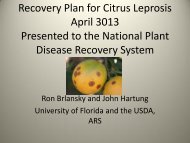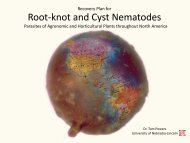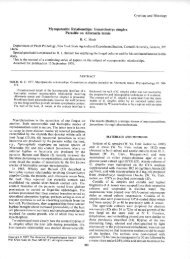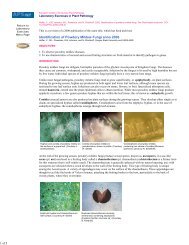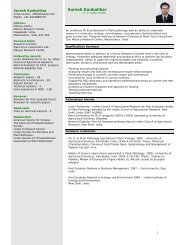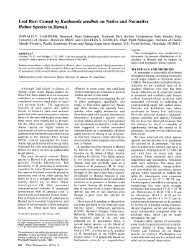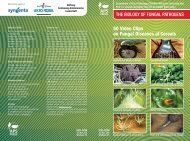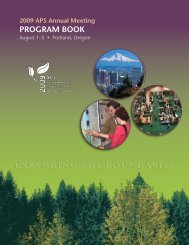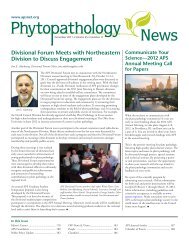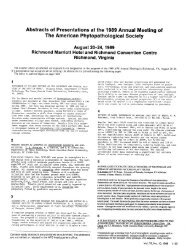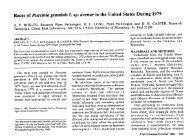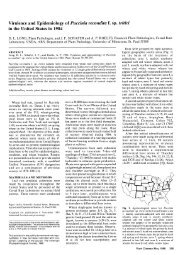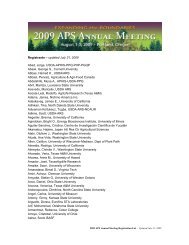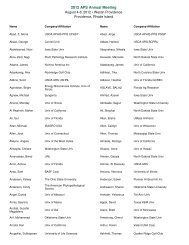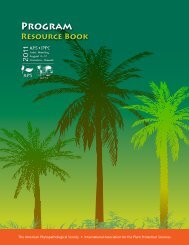See the program book (PDF) - American Phytopathological Society
See the program book (PDF) - American Phytopathological Society
See the program book (PDF) - American Phytopathological Society
Create successful ePaper yourself
Turn your PDF publications into a flip-book with our unique Google optimized e-Paper software.
Monday Morning plenary Session<br />
Listed in order of presentation.<br />
“Agriculture, Food Security and Public Health: Global<br />
Issues – Global Solutions”<br />
9:40 a.m. – 12:00 p.m. * Auditorium<br />
9:45 a.m. Introduction: When agriculture fails. Ray D.<br />
Martyn Ph.D. Professor of Plant Pathology and<br />
APS President, Purdue University, West Lafayette,<br />
IN, U.S.A.<br />
10:00 a.m. PL-7. Biopharming and plant-derived<br />
pharmaceuticals. Charles Arntzen, Ph.D. Regent’s<br />
Professor and F.E. Nelson Presidential Chair, The<br />
Biodesign Institute at Arizona State University,<br />
Tempe, AZ, U.S.A.<br />
10:35 a.m. PL-8. Plant biotechnology and agriculture: Is<br />
<strong>the</strong>re a role for public sector scientists? Roger<br />
N. Beachy, Ph.D. President and Director, The<br />
Donald Danforth Plant Science Center, St. Louis,<br />
MO, U.S.A.<br />
11:10 a.m. PL-9. The interface of science and policy: The<br />
crucial roles of food and health in economic<br />
development. Gilbert S. Omenn, M.D., Ph.D.<br />
Director, Center for Computational Medicine<br />
and Biology and Professor of Internal Medicine,<br />
Genetics and Public Health, University of<br />
Michigan, Ann Arbor, MI, U.S.A.<br />
Monday Morning Special Sessions<br />
Listed in alphabetical order by title.<br />
A Century of Turfgrass Pathology, Then, Now, & The<br />
Future<br />
8:00 – 9:30 a.m. * 205 AB<br />
Section: Disease of Plants<br />
Organizer: Joseph Vargas, Michigan State University, East<br />
Lansing, MI<br />
Moderator: Henry Wetzel, Jacklin <strong>See</strong>d, Post Falls, ID<br />
Sponsoring Committees: Turfgrass Pathology<br />
Financial Sponsors: Bayer Environmental Science; Syngenta<br />
Professional Products<br />
The symposium will provide an overview of <strong>the</strong><br />
accomplishments of academic contributions to turfgrass<br />
pathology. Overview of <strong>the</strong> past, current research topics, and<br />
generate ideas for future research as a discipline.<br />
8:00 a.m. S-20. History of <strong>the</strong> turfgrass pathologist and<br />
contributions from <strong>the</strong> beginning to 1980. J. M.<br />
VARGAS Jr. (1). (1) Michigan State University,<br />
East Lansing, MI, U.S.A.<br />
8:30 a.m. S-21. Turfgrass pathology from 1980 to today.<br />
B. B. CLARKE (1). (1) Rutgers University, New<br />
Brunswick, NJ, U.S.A.<br />
9:00 a.m. S-22. What does <strong>the</strong> future hold for turfgrass<br />
pathology? L. TREDWAY (1). (1) North Carolina<br />
State University, Raleigh, NC, U.S.A.<br />
An Evolving Culture Collection System to Meet Modern<br />
Research Needs<br />
8:00 – 9:30 a.m. * 200 ABC<br />
Section: Biology of Pathogens<br />
Organizers: Weidong Chen, USDA-ARS, Pullman, WA,<br />
Xianming Chen, USDA-ARS, Pullman, WA<br />
Moderators: Weidong Chen, USDA-ARS, Pullman, WA,<br />
Shuxian Li, USDA-ARS<br />
Sponsoring Committees: Collections and Germplasm,<br />
Mycology<br />
Collections of plant pathogens have played important roles in<br />
<strong>the</strong> advancement of plant pathology and biology in general,<br />
and our culture collection system has evolved with changing<br />
research needs. Despite that, <strong>the</strong> collection system of plant<br />
pathogens in <strong>the</strong> nation as a whole is fragmented and lacks<br />
of good organization. Now our culture collection system is<br />
at a critical juncture. As stewards of many phytopathogen<br />
collections are at or near retirement, <strong>the</strong> future of those culture<br />
collections is uncertain. This symposium will examine <strong>the</strong><br />
history of our culture collection system, discuss potential<br />
solutions to <strong>the</strong> current problems, and explore <strong>the</strong> prospects of<br />
having a national plant pathogen collection system.<br />
8:00 a.m. S-23. Cereal rust urediniospore collections,<br />
history and future needs. A. ROELFS (1). (1)<br />
Formerly Cereal Disease Lab, USDA-ARS, St.<br />
Paul, MN, U.S.A.<br />
8:30 a.m. S-24. Microbial germplasm in seed banks and<br />
clonal repositories. F. DUGAN (1). (1) USDA-<br />
ARS, Pullman, WA, U.S.A.<br />
8:45 a.m. S-25. Unique features of maintaining collections<br />
of fastidious pathogens. J. CHEN (1). (1) USDA-<br />
ARS, Parlier, CA, U.S.A.<br />
9:00 a.m. S-26. Prospects and pre-requirements of having<br />
a national plant pathogen collection system. R.<br />
BENNETT (1). (1) National Program Leader,<br />
USDA-ARS, Beltsville, MD, U.S.A.<br />
Protein Modifications During Host/Pathogen Interactions<br />
8:00 – 9:30 a.m. * 200 FG<br />
Section: Molecular/Cellular Plant Microbe Interactions<br />
Organizers: Dennis Halterman, USDA-ARS/University of<br />
Wisconsin-Madison, Madison, WI; Guo-Liang Wang, Ohio<br />
State University, Columbus, OH<br />
Moderator: Dennis Halterman, USDA-ARS/University of<br />
Wisconsin-Madison, Madison, WI<br />
Sponsoring Committees: Biochemistry, Physiology, and<br />
Molecular Biology, and Host Resistance<br />
This symposium will cover <strong>the</strong> role of post-translational<br />
modifications in host/pathogen interactions. Protein<br />
modifications such as phosphorylation, ubiquitination, and<br />
ADP-ribosylation are now being studied intensively for <strong>the</strong>ir<br />
role in proper signaling during disease resistance responses.<br />
Recent results discussed in this growing area of research<br />
will expose attendants to what will be an important future<br />
scientific focus of molecular plant-microbe interactions.<br />
39<br />
MOnDAy



